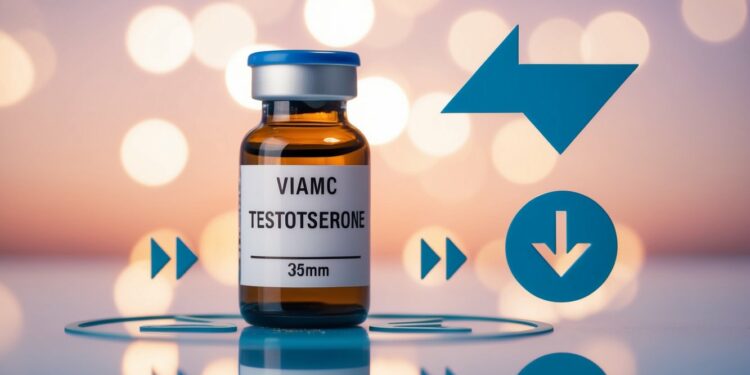Testosterone, the hormone that plays a key role in male development, has been declining in American men over the past few decades. Studies show a “substantial” drop in testosterone levels since the 1980s across different age groups. This decline affects both older men and younger adults, with some research suggesting that about 20% of men aged 15-39 years experience testosterone deficiency.
As you age, your testosterone naturally decreases by about 1-2% per year after age 30, which can affect your muscle mass, sex drive, and overall energy levels. This gradual decline is normal, but the accelerated drop seen in recent generations has scientists concerned. The reasons behind this trend aren’t fully clear, though connections to increasing rates of obesity, diabetes, and lifestyle factors may play a role.
The effects of lower testosterone can impact your daily life in several ways. You might notice reduced sex drive, erectile issues, decreased muscle mass, mood changes, or even hot flashes. While aging naturally reduces testosterone, the widespread decline across younger populations suggests other factors may be at work in our modern environment.
Understanding Testosterone and Its Normal Decline
Testosterone plays a vital role in men’s health, affecting everything from muscle development to mood. As you age, your body naturally produces less of this important hormone, which can lead to various changes in how you feel and function.
The Role of Testosterone in the Body
Testosterone is the primary male sex hormone that helps develop male physical features. Your body needs this hormone for:
- Muscle mass and strength development
- Bone density maintenance
- Fat distribution regulation
- Red blood cell production
- Sex drive and reproductive function
- Mood regulation and energy levels
Your testicles produce most of your testosterone, with small amounts coming from your adrenal glands. During puberty, testosterone levels surge, helping you develop deeper voices, facial hair, and other male characteristics. In adulthood, this hormone continues supporting tissue maintenance, energy, and sexual function.
Aging and Hormonal Changes
As you get older, your testosterone production naturally decreases. This decline typically begins around age 30, with levels dropping about 1-2% each year afterward. By age 70, many men have testosterone levels significantly lower than in their youth.
Several factors influence how quickly your levels decrease:
- Lifestyle factors – Poor diet, lack of exercise, and inadequate sleep can accelerate decline
- Weight changes – Obesity strongly correlates with lower testosterone
- Health conditions – Diabetes, high blood pressure, and other conditions may affect production
This natural decrease explains many age-related changes you might experience, like reduced muscle mass, increased body fat, and lower energy. However, the good news is that healthy lifestyle choices can help maintain better hormone balance as you age.
Factors Contributing to Low Testosterone Levels
Several key factors can lead to declining testosterone levels in your body. Understanding these factors can help you identify potential causes of low testosterone (low-T) and take steps to address them.
Obesity and Testosterone Levels
Carrying excess weight, especially around your midsection, significantly impacts your testosterone production. Fat cells convert testosterone to estrogen, which lowers the amount of testosterone in your bloodstream. Studies show that men with abdominal obesity have testosterone levels up to 30% lower than men of normal weight.
The relationship works both ways – low testosterone makes it easier to gain weight, while weight gain further reduces testosterone. This creates a challenging cycle that’s difficult to break.
Weight loss through diet and exercise has been shown to naturally boost testosterone levels. Even modest weight loss of 5-10% can lead to measurable improvements in hormone levels.
Impact of Stress and Lifestyle
Your daily habits and stress levels play a crucial role in hormone production. Chronic stress increases cortisol, a hormone that directly interferes with testosterone production.
Poor sleep quality is another significant factor. Most testosterone release happens during deep sleep, so getting less than 7 hours might prevent optimal hormone production.
Excessive alcohol consumption can damage cells in your testicles and reduce testosterone. Similarly, smoking has been linked to lower testosterone levels.
Regular exercise, particularly strength training, helps boost your testosterone naturally. However, excessive endurance exercise might temporarily lower levels.
Maintaining healthy lifestyle habits like adequate sleep, stress management, and moderate alcohol consumption can help preserve your testosterone levels.
Diabetes Mellitus and Hormonal Health
Type 2 diabetes has a strong connection to low testosterone levels. Research shows that men with diabetes are twice as likely to have low testosterone compared to men without diabetes.
High blood sugar levels can damage the cells that produce testosterone in your testicles. Insulin resistance, a hallmark of type 2 diabetes, disrupts the hormonal signals needed for proper testosterone production.
The relationship is bidirectional – low testosterone increases your risk of developing diabetes, while diabetes further lowers testosterone levels.
Managing your blood sugar through diet, exercise, and medication not only helps control diabetes but may also help preserve or improve your testosterone levels.
Health Consequences of Testosterone Decline
Testosterone decline can impact your body in several ways, affecting everything from physical strength to emotional well-being. Understanding these effects can help you recognize symptoms and seek appropriate treatment.
Effects on Muscle Mass and Strength
When your testosterone levels drop, you may notice changes in your muscle composition. Your lean muscle mass might decrease, making it harder to maintain the same strength you once had. This process is often linked to sarcopenia, the age-related loss of muscle tissue.
You might find everyday activities becoming more difficult. Tasks like carrying groceries or climbing stairs could require more effort than before. This isn’t just about looking less muscular—it affects your functional ability.
Regular exercise, especially strength training, can help slow this process. Even with lower testosterone, staying active helps preserve what muscle mass you have. Some men find that working with a healthcare provider to address testosterone levels alongside exercise gives better results.
Bone Density and Cardiovascular Health
Testosterone plays a key role in maintaining your bone density. As levels decline, you face an increased risk of osteoporosis and fractures. Your bones may become more fragile, making injuries more likely during normal activities.
Your heart health can also suffer. Research suggests links between low testosterone and higher risks of cardiovascular events. You might experience increased blood pressure or changes in cholesterol levels.
Regular check-ups become especially important as you age. Bone density scans can track changes in your skeletal health. Your doctor might recommend lifestyle changes or treatments to protect both your bones and heart as testosterone naturally decreases.
Sexual Function and Mental Well-being
Perhaps the most well-known effects of testosterone decline relate to sexual function. You may experience reduced libido (sex drive) or erectile dysfunction. These changes can happen gradually but often become more noticeable over time.
Beyond physical symptoms, your mental health might be affected too. Many men report feelings of depression, irritability, or lack of motivation when testosterone levels drop. You might feel less energetic or have trouble concentrating on daily tasks.
These emotional changes aren’t just “in your head”—they have a biological basis. Testosterone influences brain chemistry related to mood and cognition. If you notice persistent changes in your mood alongside physical symptoms, discussing hormone levels with your doctor could help identify solutions to improve your quality of life.
Approaches to Testosterone Treatment and Management
Men with low testosterone have several treatment options that can help restore hormone levels and improve symptoms. These approaches range from medical treatments, natural herbal treatments to lifestyle changes that can make a significant difference.
Testosterone Replacement Therapy
Testosterone replacement therapy (TRT) is a medical treatment for men diagnosed with hypogonadism. Your doctor might recommend TRT if your blood tests show low testosterone levels and you have symptoms like fatigue, low sex drive, or mood changes.
TRT comes in several forms. You can choose from:
- Skin gels or patches (apply daily)
- Injections (weekly or biweekly)
- Pellets (implanted under skin, last 3-6 months)
- Oral/buccal tablets (applied to gums)
- Nasal sprays (used multiple times daily)
Each method has pros and cons. Gels are easy to apply but can transfer to others through skin contact. Injections work well but cause ups and downs in testosterone levels. Your doctor will help you choose the best option for your lifestyle.
TRT can improve energy, mood, sex drive, and muscle mass. However, it requires ongoing monitoring to check for side effects like sleep apnea, blood clots, or prostate issues.
Lifestyle Changes and Nutritional Considerations
You can naturally support your testosterone levels through everyday choices. These approaches can help whether you’re on TRT or trying to prevent testosterone decline.
Weight management is crucial since excess body fat converts testosterone to estrogen. Losing even 10% of your body weight can boost testosterone levels if you’re overweight.
Regular exercise significantly impacts hormone production. Try to include:
- Strength training (2-3 times weekly)
- High-intensity interval training
- Regular physical activity
Sleep quality directly affects testosterone production. Aim for 7-8 hours of quality sleep each night.
Nutritional choices matter too. Focus on:
- Healthy fats (olive oil, avocados, nuts)
- Zinc-rich foods (oysters, meat, pumpkin seeds)
- Vitamin D (fatty fish, sunlight exposure)
- Limiting alcohol consumption
Stress management through meditation, deep breathing, or hobbies can also help maintain healthy testosterone levels by reducing cortisol.









